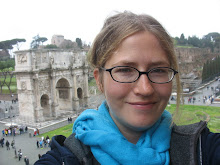I blame the researcher; it was his idea after all. I'm not sure how it happened but during his time working out of my village he learned about this group of herders who wanted to expand their operation into pasteurizing milk. And his thought was: this is something the local Peace Corps Volunteer could really help with.
I'm assuming all of this of course, because he never said a thing to me about it. It was only when Ba, the guy he was staying with and a local NGO worker, stopped me after English class to mention it. Still this is how I'd like to think my foray into the wild world of dairy production.
So this is my version of the chain of cause and effect that led me one June morning to be sitting in the middle of a small village 30k away, surrounded by about 40 people to discuss what they wanted for the future. I know, I know I'm a health volunteer but promoting milk is part of good nutrition and I was under the impression they had already done a lot of ground work so I didn't think I'd exactly be doing a hardcore small business development.
Oh false impressions.
So basically they knew of another village and had the idea to replicate their working model. If only it was so simple. Still they were really willing to make this work. They went through all the steps they needed to start a working model. We visited other facilities, organized work groups, and even started work.
Some of my best days have been working with them, but we have had our share of problems too. Just by being here I've both helped and thrown a monkey wrench into parts of the project. The fun of being a foreigner working on development practices. For example, while Ba was helpful sometimes he seemed to just assume things about the project and the group and I felt like that stifled dialog. There were problems with people trying to take advantage of the group because they saw there was outside help. I was able to do damage control on most of it but it still is disheartening to see people so willing to take advantage.
Then there was the time the Herders' Co-op President went to Bamako and found an organization who works with setting up milk pasteurization facilities. While the person he needed to talk to was out of town he made a great contact, which I then started calling to see how they could help us. In vain hopes of getting any information on how to successfully run this sort of business I set up a meeting. Apparently the answer is they couldn't really, as we were outside of their zone of intervention and they wanted a lot of money to help. Even without their direct help, seeing my utter cluelessness he decided to do us a favor and take us on a visit to a site near Segou. So while it was a positive result it was also a little depressing because he was willing to help me but I'd be willing to bet he wouldn't have gone so far if it was just the people from the co-op.
With all our successes and setbacks things have finally come together. The women are working together to pasteurize milk, reselling it into the Bamako market and proving to themselves that they can be successful. I always kinda wondered if they only really pulled it together to work when they knew I'd be there and watching, but the other day as I took transport past their village I did what I always do: I looked out to see what the women were up to. They were hard at work.
The Co-op members on our trip to the Laiterie
This place was so professional they even gave us special shoes to wear so we wouldn't bring in dirt!
The Kasila operation works with 1000s of liters of milk, this is a machine that pasteurizes something like 100 liters at a time. Kinda a shock considering we are only doing that much in a day!
Selling milk to the passing buses. Women literally sprint down the road with buckets of milk on their arms and heads to get their first and sell their product.
Walking back to their benches as the bus goes on
First day of work: two women straining and pasteurizing milk at the site of their new Laterie.
Here's what they have to work with under their thatch hanger.
Again with the filtering and boiling! They did over 60 liters that first day!!
This is the dishes station. I was constantly suprised by how good they were about washing buckets and utensils. If someone forgot the others would make sure she remembered to do it.
Filtering again post boil. The baby on the back brings a new meaning to take your child to work.
These are my future hygiene trainers at a small training we organized to teach them all about good hygiene practices and how to teach others.
I've got to say while I'm proud of all the work I've done and I hope that somebody has learned something from me, this project, this project I hope to find in a few years has continued on.











No comments:
Post a Comment